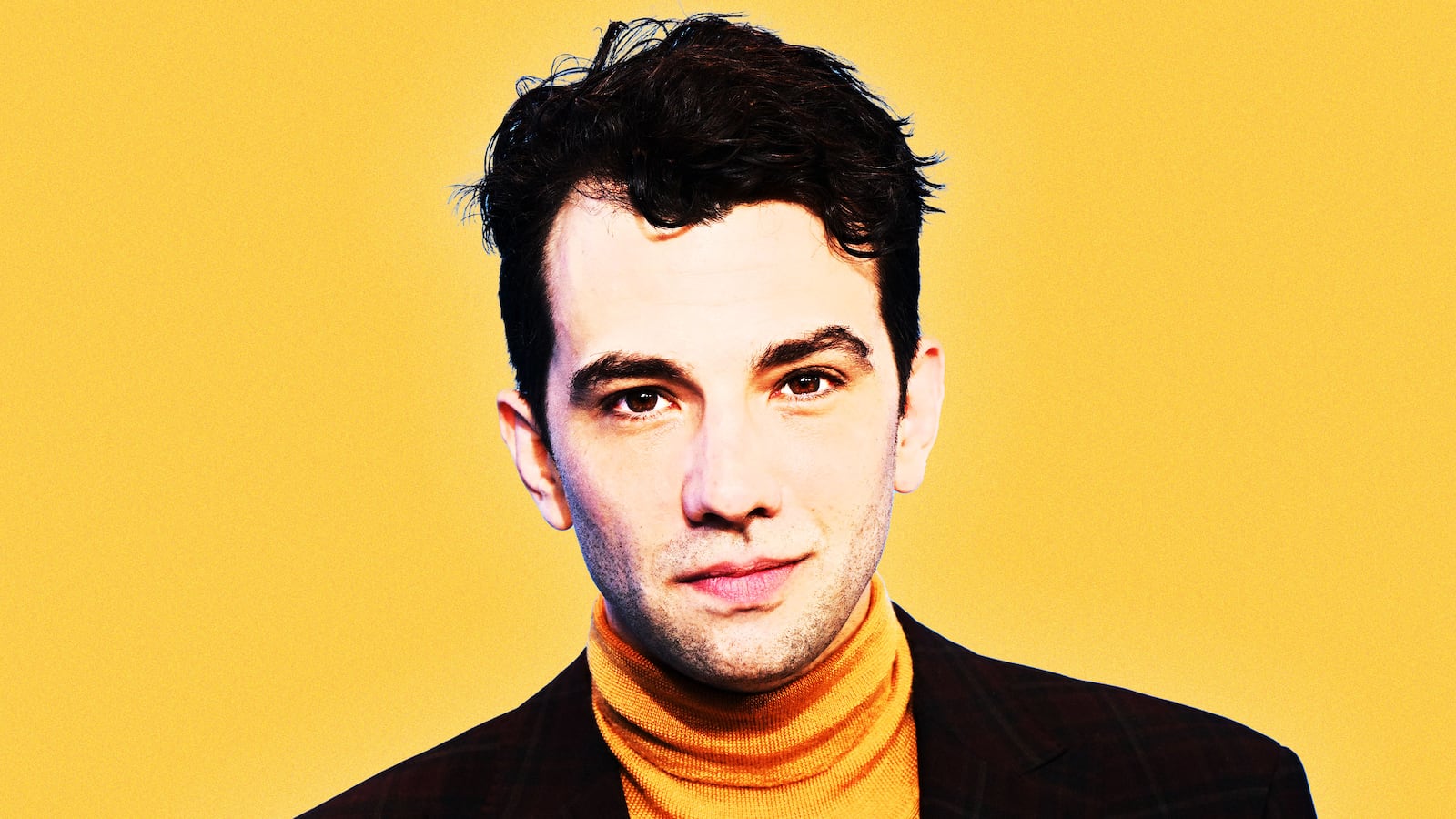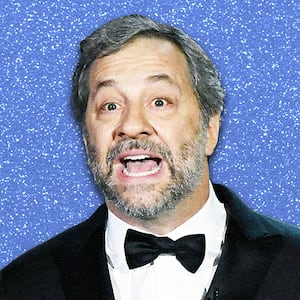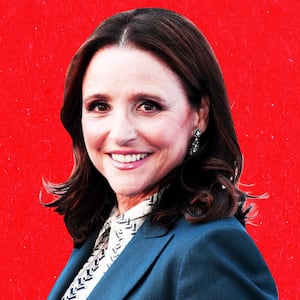Jay Baruchel never intended to be a comedian. But there was a brief moment in the mid-2000s when he made what he now describes as the “stupid” decision to try and become a movie star.
In this episode of The Last Laugh podcast, the Canadian actor talks about taking on his most dramatic role yet in the new film BlackBerry, about the rise and fall of Canada’s predecessor to the iPhone. Baruchel also traces the story of how Judd Apatow plucked him from obscurity to star in the short-lived Fox sitcom Undeclared, setting off a string of roles in comedy hits like Knocked Up, Tropic Thunder, and This Is the End, a movie he was convinced would be a total disaster—not just because of his very real beef with co-star Jonah Hill—and ended up wildly exceeding his expectations.
Baruchel, who goes outside of his comfort zone to play Mike Lazaridis, the man who invented the BlackBerry, says his performance in the new film exists somewhere in the “uncomfortable gray area between scripted and documentary, comedy and drama.”
As writer-director Matt Johnson, who also plays Lazaridis’ best friend and co-founder Doug Fregin in the film, recently told The Daily Beast, “I think that the thing that people get wrong about drama, and one of the reasons that I’m so allergic to most movies, especially melodramatic movies, is that everybody forgets that everyone’s funny. I’ve never met somebody who’s not funny.”
Baruchel agrees, explaining that the film’s central narrative about a “bunch of nerds” who “changed the world” is “compelling and stressful and kind of inspiring” while also being completely “preposterous.”
“Life is an inherently ridiculous proposition and people caring about something deeply and working hard is inherently funny,” he adds.
Blackberry gives Baruchel more room to stretch his dramatic acting muscles than most of what he’s been given the opportunity to do in the past. But he pushes back on the idea that he’s actually doing something new in the film—and says the same can be said for his co-star Glenn Howerton, who’s best known for It’s Always Sunny in Philadelphia but is also a Juilliard grad.
“It’s different from what people are used to seeing us do, not so much different from what we’re used to doing,” Baruchel says. “And it’s all the same shit, by the way. It’s all presence and focus and responsibility and truth and being the steward of the narrative that the script and the movie needs you to be, whenever it needs you to be that. The job is the same if it’s a comedy or a drama.”
As much as Baruchel may have stumbled his way into comedy with roles in Apatow projects like Undeclared and Knocked Up, he’s quick to point out that he was also doing drama from the beginning. “I get my ass kicked pretty brutally in Million Dollar Baby,” he says of his first job after Undeclared wrapped what ended up being its only season.
“I don’t want to say it was an accident,” he says of his comedy-focused persona. “Because I have no regrets really. I wish maybe I hadn’t done the ‘cum in my pants’ scene in She’s Out of My League, but for the most part I don’t have any regrets.”
Below is an edited excerpt from our conversation. You can listen to the whole thing by subscribing to The Last Laugh on Apple Podcasts, Spotify, Google, Stitcher, Amazon Music, or wherever you get your podcasts, and be the first to hear new episodes when they are released every Tuesday.
You’ve said that it was around the time of Knocked Up and Tropic Thunder that you “tried to become a movie star.” Is that accurate? What did that look like for you?
Yeah, it was stupid. There was this year directly following that where I had like five things come out in one year. Off of Tropic Thunder, which was a DreamWorks thing, I got She’s Out of My League while I was still filming in Hawaii. And then also, I auditioned for How to Train Your Dragon from there, which was another DreamWorks thing. And I was also at my most piss-and-vinegary at 26 and so I remember saying to my agent, “Let me read for and put myself on tape for whatever all the big guys are getting, I’ll mop the floor with them! At least let me get in the door. And if I lose it, let me lose it because I’m not good enough. But I want a shot and I think I really want to do this. I want to go for the ring you guys have been telling me to go for.”
And I was told, “Well, some of the guys you’ve mentioned”—who I won't mention here—“they play the game, they’re at all the right parties, they live down here and you refuse to live in California.” Once everything started to come out, and it started with She’s Out of My League, I remember gearing up for the press tour and that vivid sensation of being on a roller coaster on the incline that I couldn’t get off; it was too late because it had already left the station. And it was my fault. Nobody said you need to do this. Nobody said you need to be a movie star. And it was just my competitive, chip-on-my-shoulder of seeing guys in trailers and on billboards and thinking, “Who the fuck is this?” And then realizing pretty early on in that cycle that it wasn’t for me and I wanted off pretty quickly.
What made you realize that?
All of it. Having to have a stylist, having to go hustle a movie in a bunch of different cities, having to have my picture taken, having to be in front of a bunch of people, having to go talk to the Hollywood Foreign Press. All of this weird shit that was really hard for me to do where all I wanted to do was kind of fuck off a bit. And I know that often that can sound sort of ungrateful. I adore the work and I love movies. I just hated all of the fancy shit, I guess. I don’t do well in crowds. I don’t do well with a bunch of people staring at me. I was raised to be ashamed of vanity and to spend my life playing defense against it. And this was forcing me to think of myself in parameters that I thought were loathsome. And in a bunch of different ways it was really uncomfortable for me and I wanted off the fucking thing. And my mother reminded me, she said, “Before you went down to the States, you said if you had a choice you’d always want to be an actor, not a movie star.”
Now, there’s a lot of good stuff that comes from being in a bunch of big movies. You got a lot of good free shit and the dough is good, and hopefully it’s a means to get to work with people that you respect and whose work you love. But all the same, I was like, I have to meet them halfway. I thought I wanted to be Jake Gyllenhaal and I fucking really don’t. It doesn’t mean I want to do nothing, but I definitely don’t want to do that. I’m not comfortable with doing that. And so, to the extent that anybody cares about me or my career, there’s always a recurring thing of like, “I’m back.”
You’re always making a comeback.
Yeah! And it’s like, I never fucking stopped. I just didn’t fucking put myself front and center in a bunch of big shit because it was killing me. This is about as famous as I’m comfortable being.
I wonder if a lot of it has to do with being compared to Seth Rogen, James Franco, Jonah Hill, some of these guys who have become bigger movie stars in that way.
I think it’s because a lot of people assume that everything would grow unless interfered with, that nobody would ever choose to be less famous, choose to be less wealthy. Who would ever do that, right? Well, I fucking would! I have a great life in Canada, and I can look after my family and I can get shit going if I want to, or try to, at least. But I just didn’t want to be a fucking movie star. Whatever I am now, that’s kind of what I want to be.
Oddly enough, it seems like you were able to channel some of this stuff into This Is the End, playing this exaggerated version of yourself in this big movie and putting yourself out there in a big way. Was there any hesitation to do that?
Yes, loads of it! I was convinced it was going to be awful. Because basically, it’s based on this short that Seth and I did a long time ago called Jay and Seth Versus the Apocalypse. And so for years we had been trying to get it going as a movie. And then there was this idea of filling it with this Cannonball Run, rogue’s gallery of fucking famous people. And I was like, “Well, who the fuck wants to see that?!” It’s going to be like an MTV Movie Awards sketch for two hours.
Yeah, which it could have been.
Very easily! And in fact, on set I was convinced it was going to be terrible. And I had to eat a bunch of crow about it, which is good, because I’d rather be in a good movie than a bad movie. I don’t want, just for the sake of being proven right, to be in a shitty movie, that would be fucking terrible. But yeah, I thought the world doesn’t love rich people and it really doesn’t love famous people, so talking about being rich and famous a bunch will probably make a lot of people fucking hate us.
Although we do see you all get punished, so there’s a catharsis there too.
There certainly is. I was also real crabby throughout that whole movie. And again, not telling tales out of school, I don’t think, Jonah [Hill] and I don’t get along super well, or at least didn’t back then.
That comes through on screen.
Yeah, no fucking shit it does! And also it was this weird thing of mining personal shit. But not for catharsis, just for comedy. And in just the most commoditized, capitalist way of like, we’re going to dig up real personal shit, but nobody’s going to go home feeling better about it. We’re just going to turn it into a fucking product.
What about the relationship with Seth? Was there any part of working through it in the film that was helpful?
No, because we never talked about any of the real shit. It never came up for real, because we’re both 1982 kids, which means that we were raised in the great misogynistic tradition of not talking about shit. We’ll air grievances, we can be mad at each other and say that, but it’s very rare to be vulnerable. So yeah, that was weird. That was a fucking weird thing to be doing.
It’s not going to be solved by a Backstreet Boys dance party.
Certainly not. But then I saw the first rough cut and I was like, “Holy fuck, this is funny as fuck. And Jonah is very good in it.” That’s when I knew it was a good movie, was when I was laughing at Jonah’s shit that I never once found funny on set. And then in the movie I actually found myself laughing.
That scene where he’s giving you all of those extra compliments and telling you how much he enjoys you? You didn’t find that funny in the moment?
Not even fucking kind of. That was exhausting. Yeah, it sucked. And so watching it and giving him love in my heart of hearts, and then to everybody who would ask, that’s how convinced I am that it’s a good movie. I was dead set in my beliefs that it was a bunch of wanky inside baseball bullshit and that it just wasn’t working. But Seth and Evan [Goldberg] made a special movie that was really fucking funny and all the performances sing. And I was proven wrong. My experience wasn’t necessarily wrong. I’m not saying I wasn’t justified in being annoyed sometimes. But all my assumptions about it were wrong.
Listen to the episode now and subscribe to The Last Laugh on Apple Podcasts, Spotify, Google, Stitcher, Amazon Music, or wherever you get your podcasts, and be the first to hear new episodes when they are released every Tuesday.



